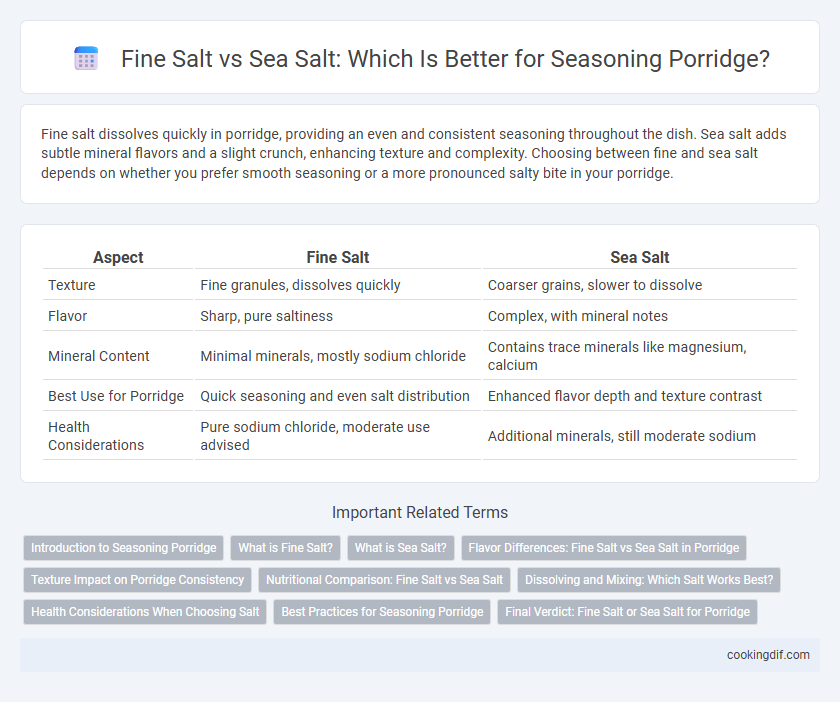Fine salt dissolves quickly in porridge, providing an even and consistent seasoning throughout the dish. Sea salt adds subtle mineral flavors and a slight crunch, enhancing texture and complexity. Choosing between fine and sea salt depends on whether you prefer smooth seasoning or a more pronounced salty bite in your porridge.
Table of Comparison
| Aspect | Fine Salt | Sea Salt |
|---|---|---|
| Texture | Fine granules, dissolves quickly | Coarser grains, slower to dissolve |
| Flavor | Sharp, pure saltiness | Complex, with mineral notes |
| Mineral Content | Minimal minerals, mostly sodium chloride | Contains trace minerals like magnesium, calcium |
| Best Use for Porridge | Quick seasoning and even salt distribution | Enhanced flavor depth and texture contrast |
| Health Considerations | Pure sodium chloride, moderate use advised | Additional minerals, still moderate sodium |
Introduction to Seasoning Porridge
Fine salt dissolves quickly, providing an even and consistent seasoning for porridge, enhancing its natural flavors without altering texture. Sea salt contains trace minerals that contribute subtle complexity and a slight crunch, offering a more nuanced taste experience when sprinkled on top. Choosing between fine salt and sea salt depends on the desired flavor intensity and mouthfeel, both complementing porridge in distinct ways.
What is Fine Salt?
Fine salt is a highly refined salt with small, uniform crystals that dissolve quickly, making it ideal for seasoning porridge evenly. It typically contains anticaking agents to prevent clumping, ensuring consistent texture and flavor distribution. Compared to sea salt, fine salt offers a more controlled saltiness level, enhancing porridge without overpowering its natural taste.
What is Sea Salt?
Sea salt, derived from the natural evaporation of seawater, contains essential minerals like magnesium, calcium, and potassium that enhance the flavor profile of porridge. Unlike fine salt, which is highly refined and stripped of most minerals, sea salt offers a coarser texture and a more complex taste. Using sea salt for seasoning porridge not only adds a subtle crunch but also imparts a richer, more nuanced seasoning experience.
Flavor Differences: Fine Salt vs Sea Salt in Porridge
Fine salt dissolves quickly in porridge, providing an immediate and evenly distributed salty flavor that enhances the dish's creaminess without altering its texture. Sea salt offers a more complex flavor profile due to trace minerals, adding subtle briny notes and a slight crunch that can elevate the porridge's sensory experience. The choice between fine salt and sea salt depends on whether a smooth, uniform seasoning or a textured, nuanced taste is preferred for porridge.
Texture Impact on Porridge Consistency
Fine salt dissolves quickly in porridge, creating a smooth and evenly seasoned texture that enhances the creamy consistency of the dish. Sea salt, with its larger crystals, provides a more pronounced crunch and bursts of saltiness, which can interrupt the porridge's silky texture. Choosing fine salt ensures a uniform seasoning that maintains the desired soft and cohesive mouthfeel.
Nutritional Comparison: Fine Salt vs Sea Salt
Fine salt and sea salt differ primarily in mineral content and processing methods, impacting their nutritional profiles when seasoning porridge. Sea salt retains trace minerals like magnesium, calcium, and potassium due to minimal processing, potentially offering additional micronutrients. Fine salt is more refined, typically containing only sodium chloride, which provides consistent salinity but lacks the diverse minerals found in sea salt.
Dissolving and Mixing: Which Salt Works Best?
Fine salt dissolves more quickly and evenly in porridge due to its smaller granules, allowing for consistent seasoning throughout the dish. Sea salt, with its larger crystals, takes longer to dissolve, which can result in uneven flavor distribution unless thoroughly mixed. For optimal texture and taste balance in porridge, fine salt is generally preferred for its superior dissolving and mixing properties.
Health Considerations When Choosing Salt
Fine salt and sea salt differ in texture and mineral content, but both primarily consist of sodium chloride affecting blood pressure. Sea salt contains trace minerals like magnesium and calcium, which some believe offer slight health benefits compared to the more processed fine salt. When seasoning porridge, moderation is key to avoid excessive sodium intake that can contribute to hypertension and cardiovascular issues.
Best Practices for Seasoning Porridge
Fine salt dissolves quickly and evenly, making it ideal for seasoning porridge during cooking to enhance flavor without graininess. Sea salt offers a coarser texture and distinct mineral taste, best sprinkled on finished porridge as a finishing touch for added contrast and complexity. Optimal seasoning balances the even distribution of fine salt with the flavor bursts of sea salt to elevate porridge texture and taste.
Final Verdict: Fine Salt or Sea Salt for Porridge
Fine salt dissolves more quickly in porridge, providing consistent seasoning throughout the dish, while sea salt adds subtle mineral complexity and texture. For smooth, evenly seasoned porridge, fine salt is ideal; sea salt suits those preferring a nuanced flavor and slight crunch. Choosing fine salt ensures balanced seasoning without interrupting porridge's creamy texture.
Fine salt vs Sea salt for seasoning porridge Infographic

 cookingdif.com
cookingdif.com